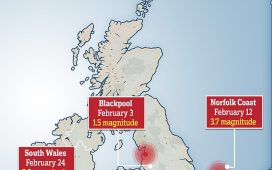[ad_1]
Some 10,000 more deaths than usual have occurred in peoples’ private homes since mid June, long after the peak in Covid deaths, prompting fears that people may still be avoiding health services and delaying sending their loved ones to care homes.
It brings to more than 30,000 the total number of excess deaths happening in people’s homes across the UK since the start of the pandemic.
Excess deaths are a count of those deaths which are over and above a “normal” year, based on the average number of deaths that occurred in the past five years.
In the past three months the number of excess deaths across all settings, has, in the main been lower than that of previous years. However, deaths in private homes buck the trend with an average of 824 excess deaths per week in people’s homes in the 13 weeks to mid-September.
Experts are citing resistance from the public to enter hospitals or home care settings and “deconditioning” caused by decreased physical activity among older people shielding at home, for example not walking around a supermarket or garden centre as they might normally.
During the pandemic in April and May, occupancy of care homes also fell significantly from 88% to 79% according to one internal industry survey seen by the Guardian with fewer people being placed into homes by their families. Weekly admission fell from 22 per 1,000 residents on 29 March 2020 to 8 per 1,000 by 31 May, according to the Knight Frank report. Given there are about 400,000 UK care bed occupants, that means a fall from 8,800 weekly admissions to 3,200 over that period – creating a substantial cohort of people who would have been in care, but stayed at home or with relatives instead.
“In the most recent weeks we can exclude the fact that much of the excess mortality is due to Covid because infection is much lower,” said David Leon, professor of epidemiology at the London School of Hygiene & Tropical Medicine. “So what we see is probably more to do with decisions that are being taken by families, by individuals, their GPs and also hospitals’ willingness to admit.”
A total of 30,260 excess deaths have occurred in private homes since the first coronavirus deaths were recorded in the UK in early March. The total number of deaths occurring in people’s homes across the UK since the first death in early March is now 43% higher than in previous years. However, less than one-in-10 of the excess home deaths are due to Covid (9%).
The latest available figures show that A&E attendances in NHS hospitals in England are below levels a year ago: there were 3.8m attendances at A&Es between June and August, down from 5m in a normal year or 29%.
NHS England said the drop was “likely to be a result of the Covid-19 response”, an indication that people are still avoiding hospitals due to the pandemic.
Delayed access to care during lockdown and people dying of non-Covid conditions which have worsened due to the person previously having the virus may also be contributing to the trend.
Leon stressed the precise reasons for the pandemic having resulted in many more deaths occurring at home was difficult to disentangle, but added it was clear that “compared to the previous five years, deaths are not occurring in hospitals”.
The ONS’s head of health index and projections, Greg Ceely, said that due to a “lower number of Covid-19 deaths in recent weeks, we would not expect delays to be caused by healthcare service capacity”.
Ceely also pointed to the possibility that deaths at home include some which occurred due to undiagnosed Covid-19 “or that the conditions people are dying of other than Covid-19 have potentially worsened due to the person previously having Covid-19”.
He added that there has been some evidence elsewhere that coronavirus can have longer-term effects on the cardiovascular system, with other countries observing an increase in non-Covid deaths from heart-related conditions in areas where C deaths from the virus have occurred.
“There is something quite profound about the fact that many more families are having to deal with people dying at home regardless of the reason,” said Leon.
More than 1,000 people died with Covid-19 every day in the UK for 22 consecutive days in April, peaking at 1,445 deaths on 8 April.
The analysis is based on figures from the Office for National Statistics, National Records of Scotland and the Northern Ireland Statistics and Research Agency.
Analysis of excess deaths covers a 27-week period for England and Wales and Scotland (weeks 11 to 37) and four months in Northern Ireland (1 March to 30 June).
[ad_2]
READ SOURCE





